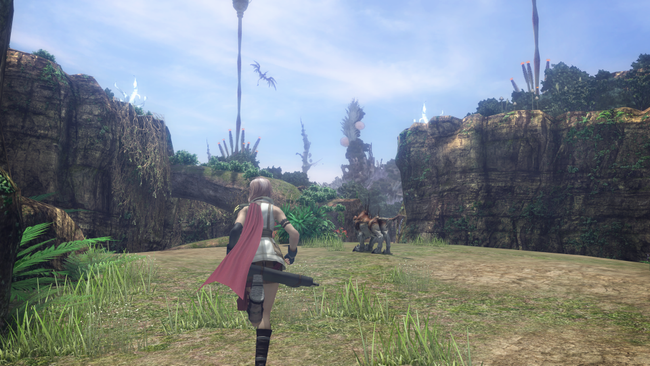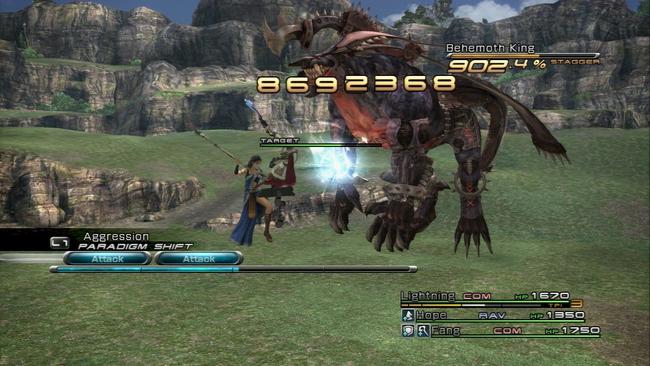
The older Final Fantasy XIII gets, the more I appreciate it
Back when it first released, it’s fair to say that Final Fantasy XIII was… controversial. A decade or so ago, lukewarm opinions on the game were rare - you either loved it, or you really hated it. In fact, I was probably one of the few people who fell somewhere in the middle - deeply appreciative of some aspects but entirely turned off by others.
Wherever you might’ve landed on the issue back when FF13 first released, I think one thing is absolutely fair to say: Lightning’s adventure has aged better than most would've expected after that initial reception - and very well may end up aging better over the years than Final Fantasy XV.
One of the things that has helped me to appreciate more of FF13 recently is the release of Final Fantasy VII Remake. An excellent offering that’s arguably the most balanced Final Fantasy experience since 2001, FF7 Remake would almost assuredly not exist in the form it does without FF13, warts and all, to help inform it.

In fact, in many ways, FF13 feels like the first prototypical attempt to remake FF7. Just look at how both games open: with explosive assaults which see the protagonists cast as terrorists of a sort, outcast from society. Snow’s little resistance group, NORA, is sort of like a mini Avalanche.
Even FF13’s infamous linearity isn’t all that different - strictly defined adventures in Cocoon spit you out into the roaming wilds of Gran Pulse just as Midgar does into Gaia at large. On paper, the moment you first step into Pulse’s open-ended mini-overworld should inspire the same kind of awe as leaving Midgar. It doesn’t because Gran Pulse, while one of the better pieces of the game, isn’t quite good enough to earn the accolades. The moments leading up to it also aren’t nearly as well-executed as FF7’s Midgar climax. It’s also painfully clear throughout that the FF13 team’s ambition and fan expectation ran rough up against what was actually achievable for a team struggling to get to grips with HD development.
That led to interview soundbites about the difficult and protracted development, including the infamous suggestion that building traditional RPG towns in HD was simply too difficult. One has to look back on comments like that with a wince - and yet I appreciate what FF13 was going for now more than ever. There are flashes of brilliance hidden in it - the sort of game that, played now, with hindsight, feels like a profound history lesson about the state of Japanese role-playing games and their development at the time.
FF13 is a time capsule, and in the modern context my respect for it has greatly risen - even if the game is as flawed now as it ever was.
The version of the game that is now available for subscribers of Xbox Game Pass is undoubtedly the definitive version of the game (at least on console), with the backwards-compatible Xbox 360 version looking stunning on Xbox One X and higher thanks to higher resolution FMV sequences along with load time and performance improvements. Hanged Edge might be a corridor we all saw far too much of pre-release, but its visual splendour still holds up incredibly well over a decade later. There's craftsmanship to much of this sewage pipe level design.

The title of this article isn’t to say that FF13 isn’t flawed. It is. It also doesn’t suggest there aren’t better alternatives; many argue that Lost Odyssey is in many ways the ‘true’, superior FF13, and I respect that claim. It’s definitely the better game. But replaying FF13 in the modern context, it’s incredibly difficult not to hugely respect so many of the choices it makes - and just as challenging to not see how fundamental and formative it is to FF7 Remake, the best game the FF series has managed in many, many years.
Where its ideas aren’t fully-formed, FF13 tries to make up for it with oodles of heart. Its sequels never quite managed to thread the needle either - FF13-2 a muddled attempt to use time travel to disguise asset reuse and Lightning Returns better, but with a great battle system dragged down by a narrative of unpalatable mush.
The original FF13 feels like it strikes a better balance, even as many aspects of its design feel vaguely unfinished. Constantly hammering confirm to auto-battle is trash, but the concept of paradigm-shifting and staggering is sublime and satisfying. The world is beautiful, but much of it has all the scope for exploration of a train carriage. The story has a surprising sense of urgency and pace, but therefore has zero downtime - which is where much of Final Fantasy’s best character building has historically taken place.
FF13 gives with one hand and takes away with the other. It’s true that meanwhile FF creator Hironobu Sakaguchi was crafting an all-around better FF-style RPG with Lost Odyssey at the same time. It’s also true that much of FF13’s team would redeem themselves, revisiting much of these ideas, in FF7R. Both of these things somehow give me more appreciation for FF13 when I replay it in the modern context, however. And it surprises me - but I’m not sure I’ll feel this way about FF15 in a decade - even though the two games are arguably equally flawed.